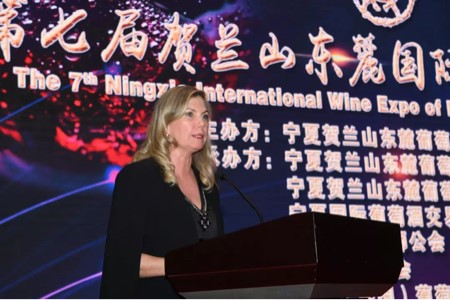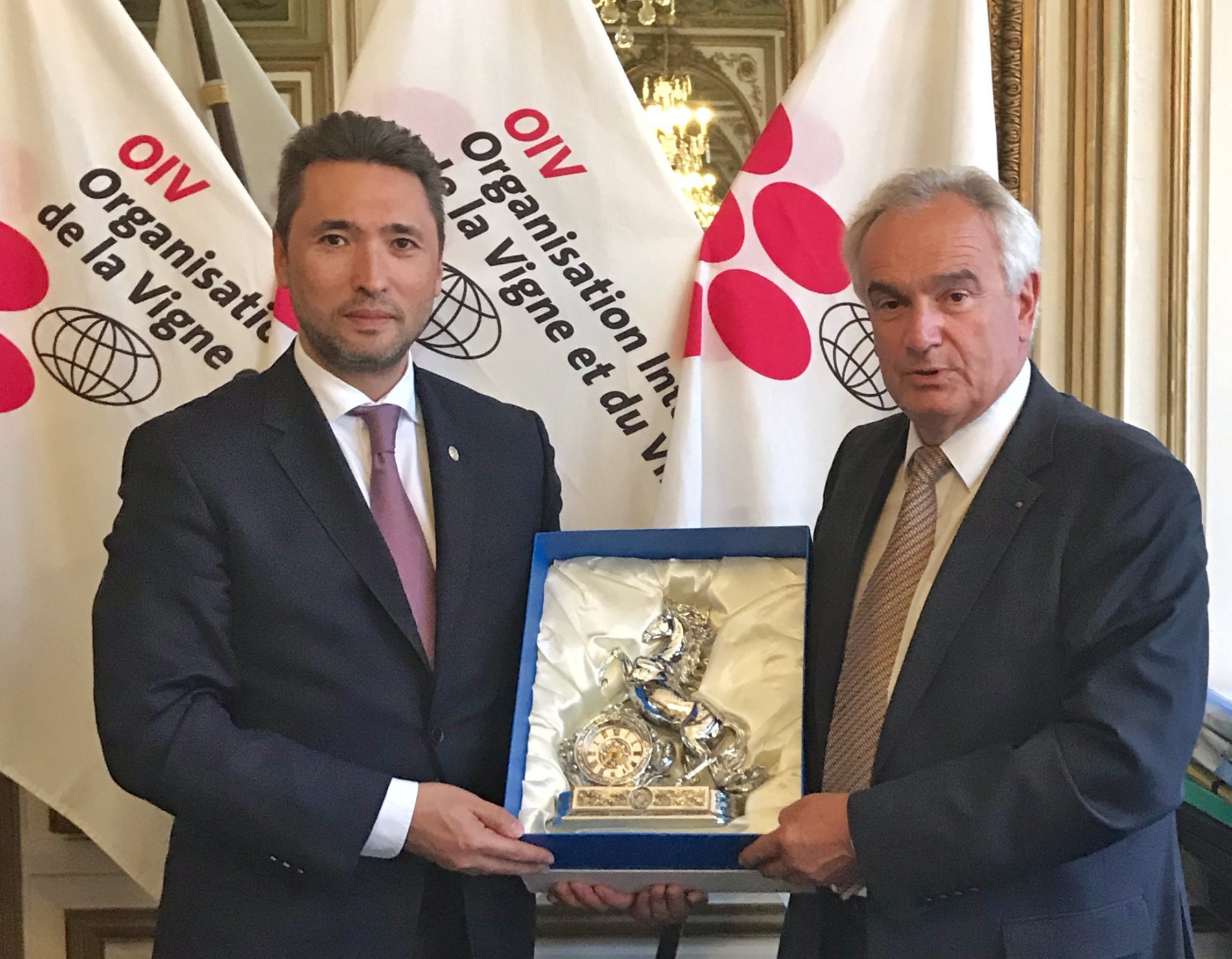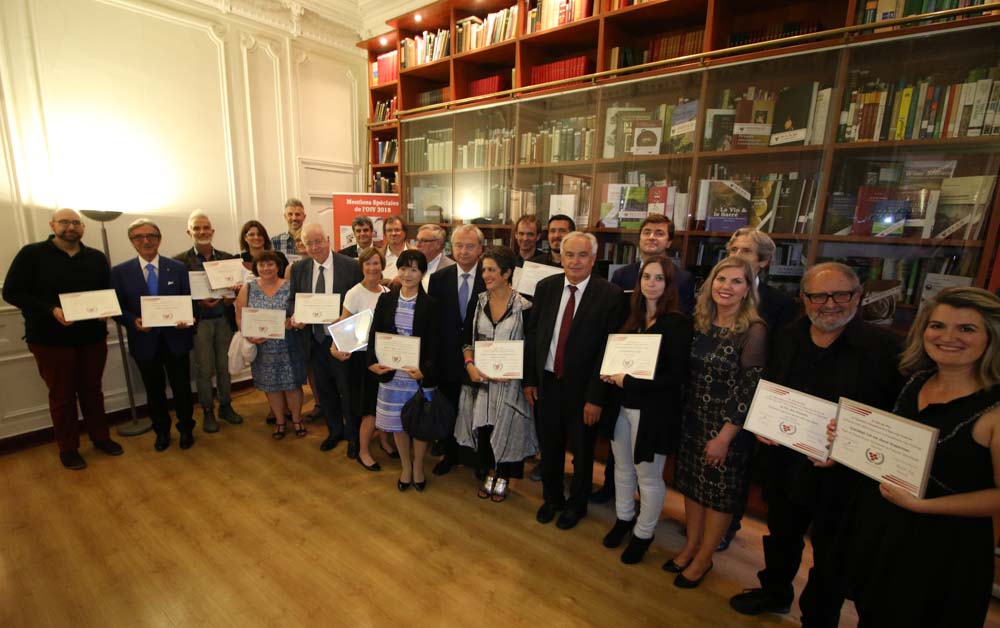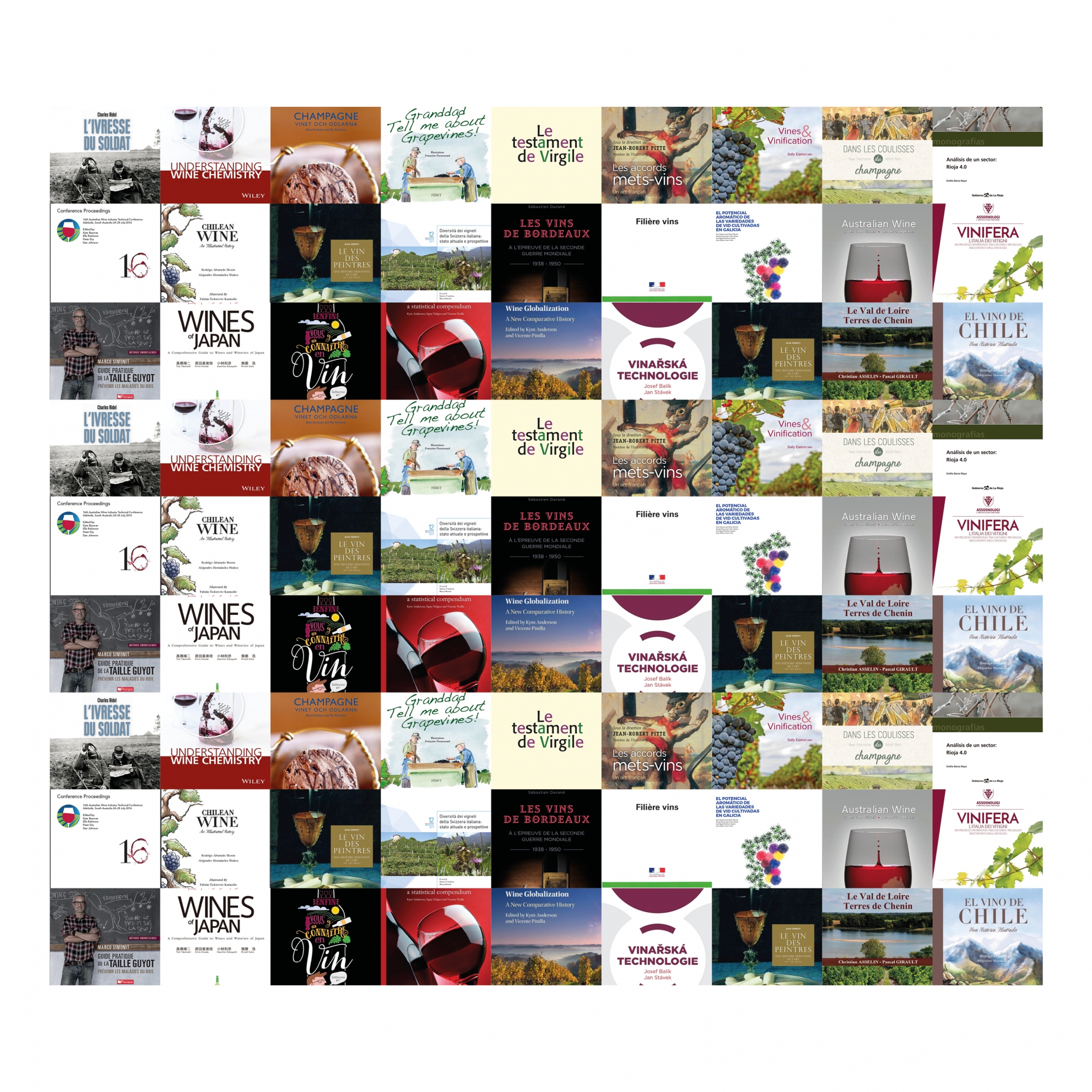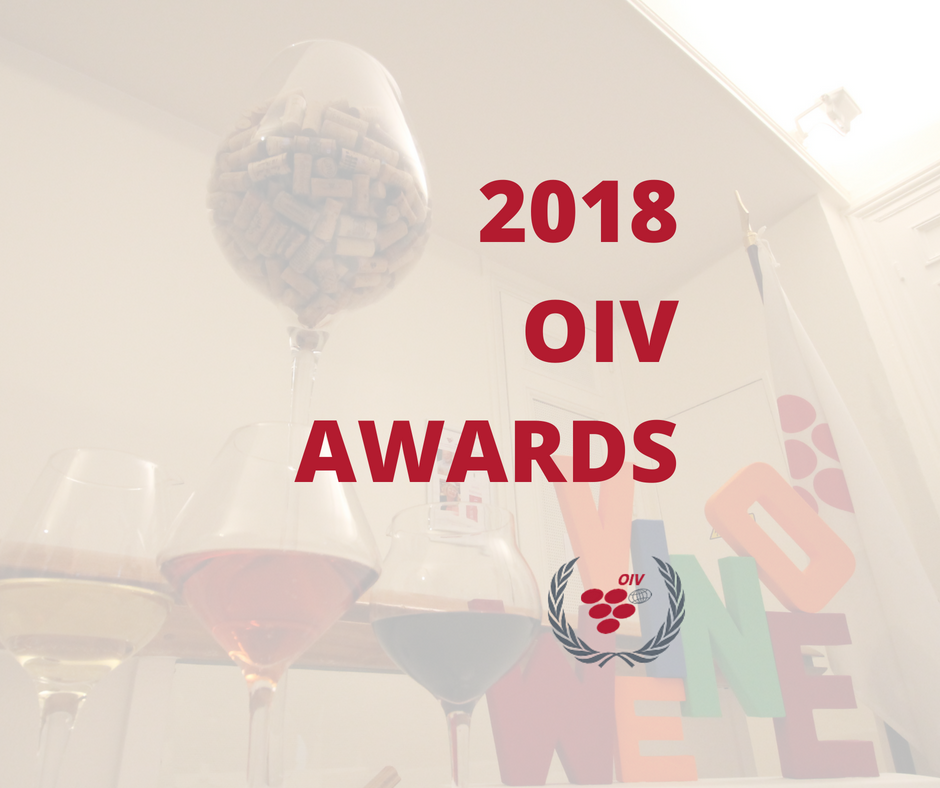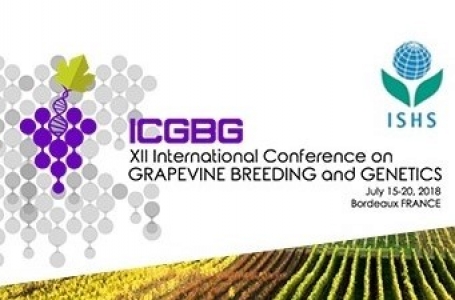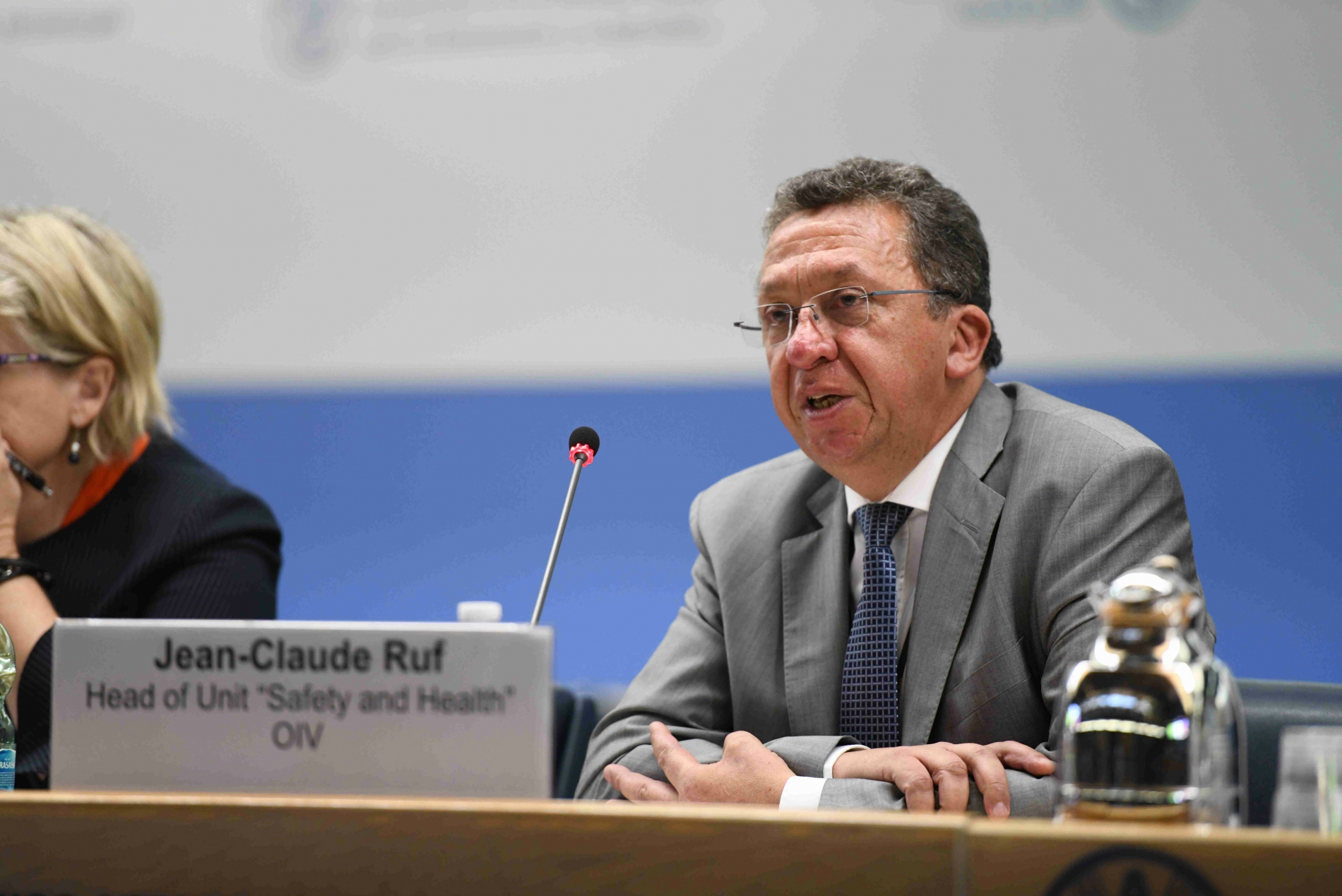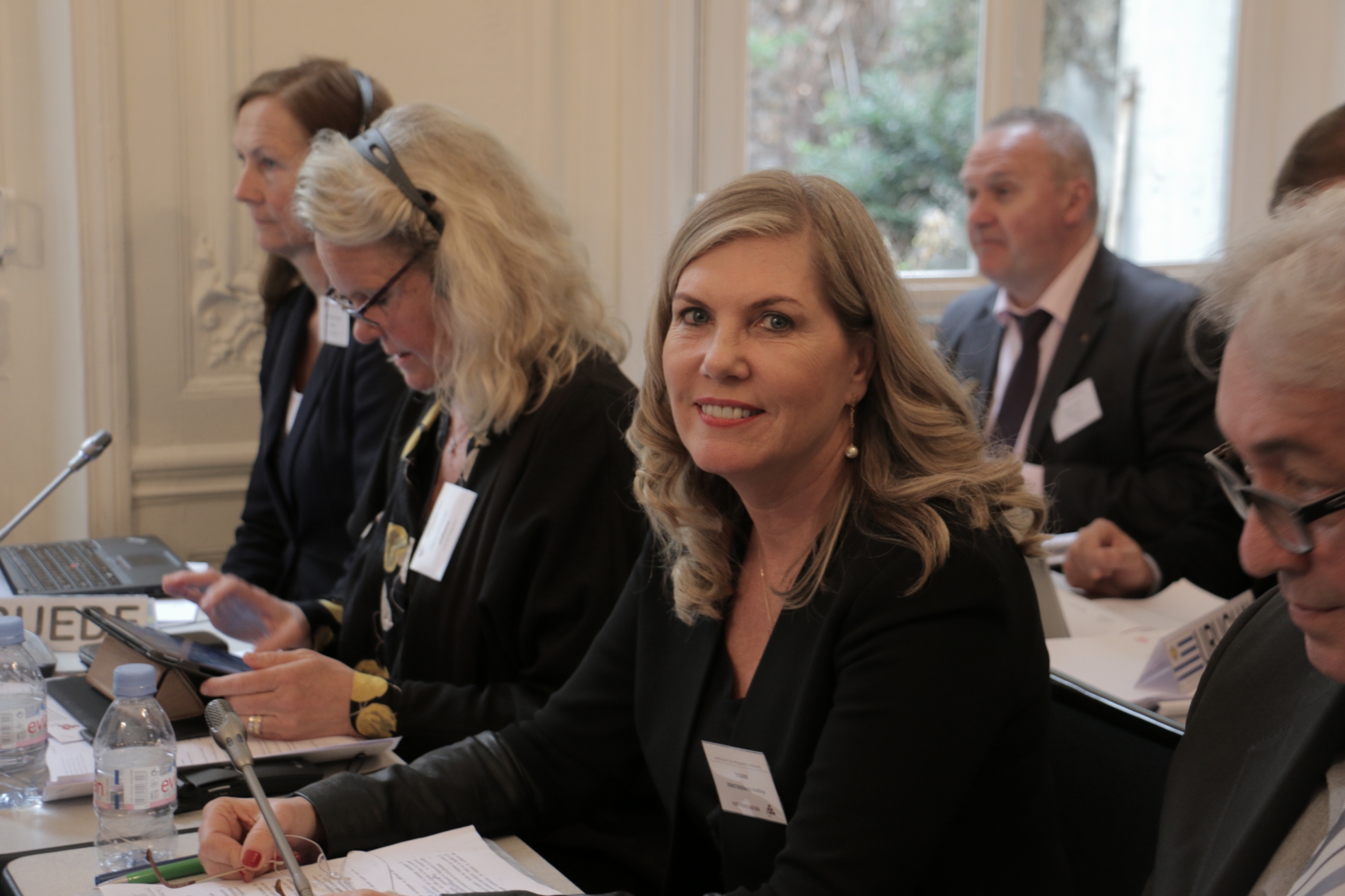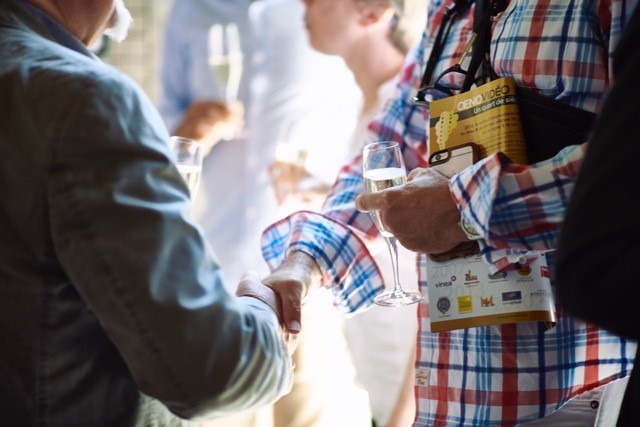11 Oct 2018
This journey took place during the 7th International Wine Exposition of Helan Mountain’s East Foothill, on 12-15 September 2018.Regina Vanderlinde at the 7th International Wine Exposition of Helan Mountain’s East FoothillRegina Vanderlinde participated in the opening of the event, for which the theme was ‘Brand Taste Appreciation’, in the presence of local authorities and of Mr Cao Kailong, Director of the Ningxia Grape Industry Development Bureau. With Mr. Mr Cao KailongAs part of the event, an exposition of wines from different Chinese regions was also organised: the ‘Belt and Road’ at Yinchuan Exhibition Center. Additionally, this trip provided an opportunity for the President to visit several wineries in the region. During her visit to China, Regina Vanderlinde met with Mr Hao Linhai, former Vice Party Secretary of the People's Government of Ningxia and former President of the Ningxia association of winegrowers. Mr Hao Linhai was awarded the OIV Merit Award during the 40th World Congress of Vine and Wine in May 2017, in Sofia (Bulgaria).With Mr Hao LinhaiViticulture in the Ningxia region has seen a very robust expansion, boosted in particular by local authorities. Wine production is focused upon quality and diversity, with over 180 wineries. This dynamism follows the model of Chinese vitiviniculture as a whole, which has recorded significant development both in terms of table grape production (the top producing country) and the production and consumption of wine (globally the 8th biggest producer and 5th biggest consumer).
10 Oct 2018
Boasting an age-old winemaking tradition, the country wishes to boost its vine and wine sector, particularly in the context of the strategic plan for agriculture, developed by President Nursultan Nazarbayev, that aims to position Kazakhstan as a global player in the field of organic production.As Jean-Marie Aurand pointed out, “After the accession of Azerbaijan, Armenia and Uzbekistan, the addition of Kazakhstan would complete the positioning of central Asia within the viticultural countries of the OIV, demonstrating the revitalization of these traditional wine- and grape-producing areas, as well as the emergence of market demand for quality products that meet international standards.”
23 Sep 2018
Organised by the Lebanese Ministry of Agriculture on the theme of ‘new strategies and technologies for the Lebanese wine industry’, the event, held at the Holy Spirit University of Kaslik (USEK), brought together leading companies from the sector united under the Union Vinicole du Liban (Lebanon’s association of wine producers), as well as a number of industry experts.Speakers from different countries (e.g. France and Italy) offered insights into the latest technical, scientific and economic developments.The Director General of the OIV, along with his Assistant, took part in the day’s activities. On this occasion, Jean-Marie Aurand emphasised the ‘close and fruitful’ relationship enjoyed with Lebanon since the country became a member of the OIV in 1995.Vitivinicultural activity in Lebanon has experienced remarkable growth over the last 20 yearsAs early as 1997, the Union Vinicole du Liban was created on the advice of the OIV. In 2000, Lebanon passed a law relating to wine, on the basis of which the National Institute of Vine and Wine was created in 2013. Over the last six years, and under the dynamic leadership of Director General Louis Lahoud, the relationship between the OIV and Lebanon has grown even stronger.Mr Aurand also noted the success of the Lebanese Wine Day events, which were held in Paris in 2010 and 2013, in Berlin in 2014, in the United States in 2016 and 2017, and this year in Switzerland. Organised by the Lebanese Ministry of Agriculture, this year’s event attracted a large audience of specialists who, over the course of one day, had the opportunity to discover the diversity and quality of Lebanese wine production. He praised the involvement of the Director General of the Ministry of Agriculture, Mr Louis Lahoud, and the support of the Minister for Foreign Affairs, Mr Gebran Bassil. During his visit, the Director General of the OIV was received by the President of the Lebanese Republic, General Michel Aoun, and by Prime Minister Saad Hariri, who both assured him of their country’s support in the activities of the OIV. Jean-Marie Aurand with:1. The President of the Lebanese Republic, General Michel Aoun 2. The Prime Minister, Saad HarirDemonstrating the importance of the vitivinicultural sector in the country, high-level meetings were also held with the Minister of Economy, Mr Raed Khoury (1); the Minister for Justice, Mr Salim Jreissati (2); the Minister for Information, Mr Melhem Riachi (3); and the Minister for Tourism, Mr Avedis Guidanian (4).Jean-Marie Aurand with the Minister of Foreign Affairs, Mr Gebran BassilVitivinicultural activity in Lebanon has experienced remarkable growth over the last 20 years; today it has almost 50 wineries whereas 20 years ago it had eight. The country produces about 80,000 hL of wine a year and exports half of its production. It also promotes native vine varieties such as Obeidy or Merweh in an effort to rediscover the roots of this age-old winemaking tradition.
17 Sep 2018
On 5 July in Paris, the international OIV Award Jury gave out 14 Awards and 10 Special Mentions among 51 competing works representing 19 countries: a very good 2018 vintage for the OIV Awards!On 18 September at the prestigious OIV Awards Ceremony – which was attended by numerous representatives from the Diplomatic Corps, the new OIV President Ms Regina Vanderlinde, OIV Director General Mr Jean-Marie Aurand, President of the OIV Award Jury Mr František Lipka, and Scientific Secretary of the Award Jury Mr Jean-Luc Berger – the 2018 winners were presented with their awards.Scientific and technical works, in addition to works intended for the general public, were honoured by the Jury. Read full press release
20 Aug 2018
At the request of the scientific community of the OIV, the members of the OIV Award Jury, who met in Paris on 5 July 2018, decided unanimously to create a new Awards category: “Sustainable vitiviniculture”.This 11th category will take into account a topic that is a major concern for OIV experts. It responds to a growing number of works addressing sustainable development in the field of vitiviniculture – which is something the OIV Jury thus wishes to strongly encourage.For the next OIV Awards, which will be open for submissions from 1 September 2018 to 28 February 2019, works covering the 3 pillars of sustainable development (environment, society and economy) will be able to compete in this new category.*Submission forms available on the OIV website from 1 September 2018 hereContact: jurydesprix@oiv.int
08 Aug 2018
2018 OIV AwardsViticulture Award / EX ÆQUOVinifera, l’Italia dei VitigniRiccardo Cotarella[IT]Edition "Assoenologi SOC COOP"&GUIDE PRATIQUE DE LA TAILLE GUYOT Prévenir les maladies du boisMarco Simonit, Massimo Giudici,Lorenzo Manfreda, Marco Ostan,Riccardo Turata, Alessandro Zanutta[FR]Edition "France Agricole GFA"Special MentionEl Potencial Aromático de las Variedades de Vid Cultivadas en GaliciaMar Vilanova De La Torre,José Maria Marques Oliveira,Ricardo Rivas Barros[ES]Edition "Xunta de Galicia"Viticulture and Enology AwardVines & VinificationSally Easton[EN]Edition "WSET Wine & Spirit Education Trust"2 Enology Award / EX ÆQUOVinařská TechnologieJosef Balík, Jan Stávek[Cz]Edition "Národní Vinařské Centrum, o.p.s."&Guides de bonnes pratiques d'hygiène - Filière vinsCoordinated by Aurélie Camponovo|FR]Edition "Editions des Journaux Officiels"Special MentionUnderstanding Wine ChemistryAndrew L. Waterhouse, Gavin L. Sacks,David W. Jeffery[EN]Edition "John Wiley & Sons Ltd"3 Economy Award1) Wine Globalization : A New Comparative HistoryKym Anderson, Vicente Pinilla[EN]Edition "Cambridge University Press"With2) Global Wine Markets, 1860 to 2016 : a statistical compendiumKym Anderson, Signe Nelgen, Vicente Pinilla[EN]Edition "University of Adelaide Press"Special mentionAnálisis de un sector : Rioja 4.0Emilio Barco Royo[ES]Edition "Consejería de Agricultura. Gobierno de La Rioja"4 Fine Arts, PaintingLE VIN DES PEINTRES - Une histoire hédoniste de l’art (XVe-XXe siècle)Jean Serroy[FR]Edition "Les Editions de La Martinière"4 Fine Arts, Adults' ComicsDans les coulisses du champagneScriptwriter: Maxe L'HermenierDrawer: Benoît Blary[FR]Edition "Les Editions Jungle"4 Literature, NovelSpecial MentionLe testament de VirgileIsabelle Chrétien[FR]Edition "Les Editions Féret"4 History and LiteratureSpecial Mention EX ÆQUOCHILEAN WINE An Illustrated HistoryEL VINO DE CHILE Una Historia IlustradaRodrigo Alvarado MooreAlejandro Hernández MuñozIllustrated byFabián Todorovic Karmelic[ES]|[EN] Edition "Origo"[ES]|[EN] Edition "Origo"&LES VINS DE BORDEAUX à l’épreuve de la Seconde Guerre mondiale 1938-1950Sébastien Durand[FR]Edition "Memoring Éditions"5 Wine and HealthL'ivresse du SoldatCharles Ridel[FR]Edition "Éditions Vendémiaire"6 Discovering and Presenting WinesGranddad Tell me about Grapevines!Pascale Bounet, Françoise Etourneaud[EN]Edition "Les Editions Féret"Special Mention EX ÆQUOAustralian Wine - Style and taste, people and placesDirected by Patrick Iland, with Peter Gago, Andrew Caillard, Peter Dry[EN]Edition "Patrick Iland Wine Promotions Pty Ltd"&Vous allez enfin vous y connaître en VinSébastien Durand-Viel and David Cobbold, authorsIllustrations of Bertrand Hoquet[FR]Edition "Larousse"7 Wines and TerritoriesWines of Japan - 日本 の ワ イ ンTeiji Takahashi, Kimie Harada, Kazuhiko Kobayashi,Hiroshi Saito[JP]+[EN]Edition "Ikaros Publications Ltd"8 Wines and GastronomyLes accords mets-vins. Un art françaisDirected by Jean-Robert Pitte[FR]Edition "CNRS Editions"9 Monographs and Specialised StudiesLe Val de Loire, Terres de CheninChristian Asselin, author coordinator of the collective of nearly 100 contributors[FR]Auto Edition Pascal Girault "Les caves se rebiffent »Special mention EX ÆQUOChampagne Vinet Och OdlarnaBritt Karlsson, Per Karlsson[SE]Edition "Carlsson Bokförlag"&Diversità dei vigneti della Svizzera italiana : stato attuale e prospettiveValeria Trivellone, Marco Moretti[IT]Edition "STSN Società Ticinese di Scienze Naturali et Museo Cantonale di Storia Naturale"10 Symposia proceedingsProceedings of the 16th Australian Wine Industry Technical ConferenceCoordinated by Kate Beames,Ella Robinson, Peter Dry, Dan Johnson[EN]Edition "The Australian Wine Industry Technical Conference Inc."
Winners of the 2018 OIV Awards presentation textes
25 Jul 2018
This conference was an excellent opportunity to get an overview of the progress made in terms of reproduction strategies and in all scientific fields directly or indirectly related to grapevine selection. With over 70 speakers, 330 participants and 26 countries from 5 continents represented, GBG2018 – placed under the patronage of the OIV – has allowed for the coverage of a number of themes, for example: the maintenance and extension of genetic resources; the genetic, phenotypical and physiological characterisation of grapevine populations; as well as the functional characterisation of the genes involved in the control of berry development, maturation and composition, and in the adaptation to biotic and abiotic stress. Representing the OIV, the Head of the Viticulture Unit, Alejandro Fuentes Espinoza, met various experts in these fields and presented the role of the OIV and its work under way within the OIV “Genetic resources and vine selection” (GENET) Expert Group. The OIV, an organisation of a scientific and technical nature, has been working for some years now on the characterisation and evaluation of principles and of methods of production and sustainable selection for grapevine genetic resources. This is an important strategic axis in order to be able to provide appropriate responses to the vitivinicultural sector.All of the themes addressed during the Conference resulted in an important exchange of data and information that are at the heart of the viticultural issues of tomorrow in terms of sustainability.
11 Jul 2018
Alongside the 41st session of the Codex Alimentarius Commission, the OIV participated in a round table of intergovernmental organizations on questions linked to the authenticity and identity of food products.During this session, facilitated by Carlos Laorden from El País, the participants emphasized the need to define a common terminology and take measures to reduce the risks of falsification and deception of consumers.The improvement of tracking systems, the adoption of new technologies and the development of new electronic systems can be important tools in the fight against counterfeiting. The OIV StandardsJean-Claude Ruf, the Scientific Coordinator for the OIV, emphasized that there exist challenges specific to the vitivinicultural sector, where fraudulent practices most often lead to a change in the quality and authenticity of products rather than to health risks.At the level of the OIV, this need to guarantee authenticity and identity is addressed through the adoption of standards, notably regarding:
- the definition of products,
- oenological practices: these must in particular take into account the consumer’s safety, not significantly modify the original qualities of the grape and the wine and not deceive the consumer,
- labelling rules,
- establishment of traceability guidelines,
- establishment of analytical norms in order to check origins and traceability.
04 Jul 2018
Regina Vanderlinde addressing the Member States after the announcement of her electionA Brazilian has been elected as President of the International Organisation of Vine and Wine for the next three years, succeeding Monika Christmann. Régina VANDERLINDE, a professor of biotechnology at the University of Caxias do Sul has been elected by the Member States of the OIV for a mandate of three years.Holding a doctorate in biological sciences with a focus in enology-ampélologie from the ‘Université de Bordeaux’ she has been a member of the Brazilian delegation to the OIV she also served as the Scientific Secretary of the Sub-commission for Methods of Analysis.She is happy that South American viticulture has been recognised by the community of the OIV and is pleased to be the third consecutive female President of the OIV. Here's a short video where the new president expresses her thanks to the member states and her future goals at the OIV presidency (in French and subtitled in English): At this General Assembly the Presidents of the scientific bodies were also elected:Commission I ViticultureVittorino NOVELLO (Italy) suceeds à Benjamin BOIS (France)Commission II EnologyDominique TUSSEAU (France) suceeds Luigi MOIO (Italy)Commission III Law and EconomyDimitar ANDREEVSKI (Bulgaria) suceeds Tony BATTAGLENE (Australia)Commission IV Safety and HealthGheorghe ARPENTIN (Moldavia) suceeds Nuria GARCIA TEJEDOR (Spain)Sub-commission Methods of AnalysisMarkus HERDERICH (Australia) suceeds Ondrej MIKES (Czech Republic)Sub-commission Non-fermented products, table grapes and raisinsAlejandro MARIANETTI (Argentina) suceeds Luis PERES DE SOUSA (Portugal)
02 Jul 2018
The Grand Jury in front of the Gabrielle Dorziat theatre ©LoïcLemahieu/AudreyMarcyThe Gabrielle Dorziat theatre in Epernay (listed as a historical monument) hosted 38 official projections, selected out of 128 films from 19 countries in the competition. This year’s festival confirmed its international scope, giving awards to productions from Chile, China, Spain, the United States, France, Great Britain, Italy and Lebanon. Consult the list of award winners (link in French).The announcement of the Award winners on 1 July 2018©LoïcLemahieu/AudreyMarcyA travelling festival since its creation, at the invitation of the Champagne Committee and the Town of Epernay, Oenovideo celebrated hitting the quarter-century mark toasting with the bubbles so characteristic of the region. At the same time as the festival, the 13th Terroir d’Images exhibition (link in French) was presented in Reims (and is on until 13 July 2018) at the Maison Diocésaine Saint Sixte, under the theme of ‘Biodiversity from daybreak to moonrise in the vineyards and surroundings’ (Biodiversité : du jour naissant au clair de lune - Dans les vignes et alentours). Over 100 photos were selected out of 1500 photos from 15 countries in the competition. The Grand Prix winner will be revealed during the official awards ceremony, which will take place on Wednesday 17 October 2018 in the Palais du Luxembourg, in Paris.
Climate change and sustainability: a central theme for the films put forwardThe OIV Press Officer, Daniela Costa, praised the quality of this year’s festival, marked by a common concern in all of the films presented: climate change and sustainability. This is a priority issue for the OIV, as attested by the presence of ‘Promote sustainable vitiviniculture’ as one of the five strategic axes established for the OIV Strategic Plan 2015-2019. Additionally, in 2015 the OIV decided to restructure its working groups through the creation of a multidisciplinary, horizontal group – the ENVIRO Group – dedicated to the theme of ‘Sustainable development and climate change’.Find out more about the work of the OIV on sustainable development and climate change:
